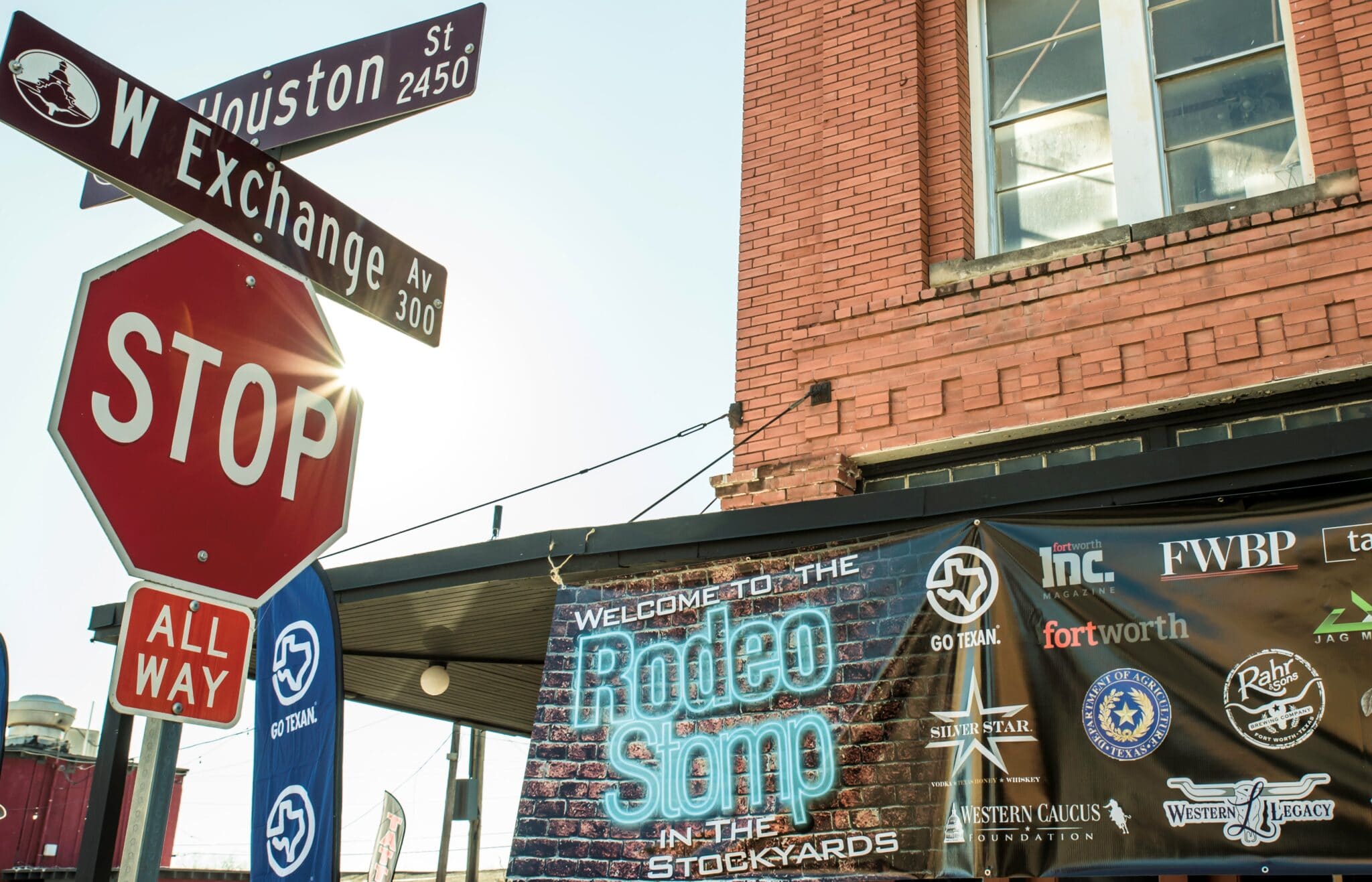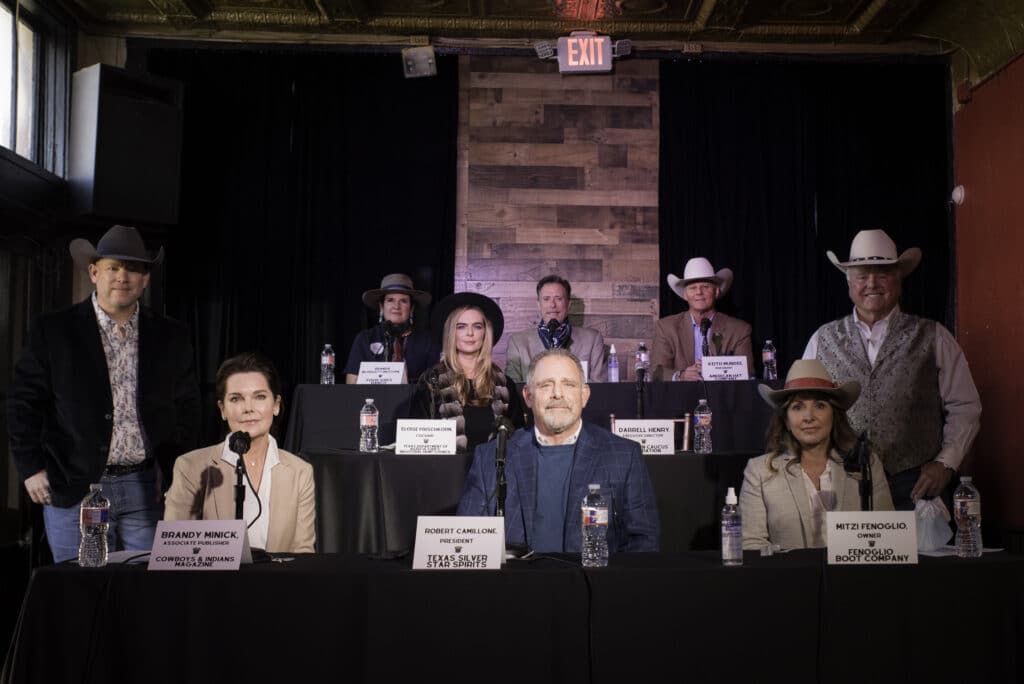Event: How the West Wins Panel Discussion
When: Friday, Dec. 4
Where: Pearl’s
Who:
- Moderator, Sid Miller, Texas Secretary of Agriculture
- Western Caucus Foundation – Darrell Henry, Executive Director
- Cowboys & Indians Magazine –Brandy Minick, Associate Publisher
- Texas Department of Agriculture’s Industrial Hemp Council – Eloise Frischkorn, Cochair
- Fenoglio Boot Company – Mitzi Fenoglio, Owner
- GO TEXAN – Dan Hunter, Assistant Commissioner
- American Hat Company – Keith Mundee, President
- Four Sixes Ranch – Brandie Blodgett-Mustian
- Texas Silver Star Spirits – Robert Camillone, President
Purpose: Western businesses and Western States have found a way to continue to thrive. The interactive media event and panel discussion examined why the West is still winning business over other states.
The event was produced by Pugnacious, one of several events the marketing firm developed for the National Finals Rodeo. The Fort Worth Business Press was one of the media sponsors of the event.
Here are some excerpts from the event:
WESTERN LIFESTYLE
Miller: Over the last few years many publications have been on a steady decline, especially with COVID. Cowboys & Indians continues to be one of the few publications that is not only profitable but continues to grow its distribution – why is that?
Minick: Well, I think it’s been definitely a challenging year for everybody in this room, and so the thing about Cowboys and Indians is we’re subscriber based. And so when we were all sheltering at home, we kept delivering to homes and kept delivering the message of the Western lifestyle to homes. The big shift for us, though, was it’s called single copy sales, and it’s the people that weren’t flying in airports or weren’t staying at hotels in the East or the West.
And so what we did is make a big shift and flood our digital platforms with content that mirrored the magazine, but then was also independent of the magazines. So that was a big change for us and a big win for us in 2020. We saw our digital audience increase by 20%. So I feel like that was a win for us, but then also a win for the entire Western industry.
HEMP
Miller: I want to go to Eloise Frischkorn. She’s co-chair of the Industrial Hemp Council for the state of Texas. We’ve grown hemp in Texas, but it’s been 80 years, so this is our first year. We’ve re-instituted the program. Give us a little perspective on it, but specifically, I want you to tell us what’s different about growing hemp in Texas, where we have an advantage other states do not.
Frischkorn: Absolutely. So it’s truly a historical moment. We have brought hemp back to Texas, thanks to the program that you, yourself, are heading. And so we’re so grateful for that. Commissioner Miller has been the head of the program, in charge of all of our hemp-related industry rules and regulations. And that’s important because we believe that Texas will be the leading state for industrial hemp. It’s an incredibly amazing agricultural product with many commercial uses. Most people are familiar with the CBD oils, and you might see the stores popping up around, but hemp is actually a plant that has so many different uses, from building materials to paper, textiles, even automobiles – the interior of BMW just started using hemp-related byproducts.
So it’s a fascinating crop that is something that we know that our state will be able to develop stronger than the other states. We just have the infrastructure and the economic advantages, and we are Texas.
Miller: Well, thank you for heading up that committee, and it’s a crop that’s been around forever. In the Revolutionary War, they took the hemp and made the sails for the ships, canvas for the tents, the uniforms. George Washington grew hemp on his farm. We’re looking forward to kind of getting back to where we started in Texas, and we intend to be the leader of that.
BOOTS
Miller: Now then, I want y’all to take a look at these boots I’ve got on right here. Those are made in Nocona, Texas. And we got somebody who can tell me all about how this boot is made because she made it. Mitzi, tell us about your boot company.
Fenoglio: Fenoglio Boot was just keeping the tradition and the people. And when I say the people, there’s been many boots made in Nocona, Texas, for hundreds of years, and we actually have second, third, and fourth-generation boot makers that are still employed with Fenoglio Boot Company.
So we kept the most important part about boot making, which was the people and the knowledge that they’ve had, and it will carry on for every boot that comes out of there. We keep the tradition. We still hand-last every pair of boots that comes out of that factory. We still check every pair of boots and pretty much either James, myself, or Trey will have our hands on every piece of paper that goes out of there.
Miller: Now, you talk about tradition and the way boots were made. Y’all have also been pretty innovative with new products. And can you just share real quickly about some of those?
Fenoglio: We are always trying to diversify with what we do. I mean, we’ve got the machinery that wasn’t there before. We’ve spent a lot on that, and we’ve spent a lot on getting more knowledge about the industry. And we have looked at doing different things with the Go Texan Program, for starters. And we also make leather labels. We can do anything with our byproducts, meaning we’re not just getting rid of them anymore. I come from a recycling background, so that kind of helps. We’re not just throwing everything away, and we’re finding different avenues to take our products, but our main focus, of course, is just to keep making and keep improving and keep finding out what it’s going to take to make it in this industry.
Miller: I’m going to go up to Assistant Commissioner Dan Hunter. We have a marketing program. It’s been around 20 years. We’re kind of … somehow became the chamber of commerce for the state of Texas. Tell us about the Go Texan Program and what’s going on there.
Hunter: Sure. Well, once again, I’ve probably got the best job in the world in that I get to promote Texas products around the world and Go Texan helps us do that. Go Texan was established a little over 20 years ago with the idea of highlighting products that were made, grown, and put together here in Texas.
And so what we’ve done is we’ve taken that to the next level. When you look at what we have to offer here in Texas, it’s not just what many people think of when we’re talking about everything from pickles to onions, to salsas, to hats and boots that are all members of the Go Texan Program. The idea is, of course, that we put Texas products on shelves, not only here in Texas, but around the world. And that’s what we’ve been focusing on is how do we put Texas in places around the world?
Before you brought me on and asked me to come take on this job here, I had the opportunity to be around the world on many different levels, and one of the things that I’ve found is, as I say, I not only have the best job in Texas, but I’ve got probably the easiest. And what I mean by that is that we can go anywhere in the world, and you go around the table and people introduce themselves and they say, “I’m so-and-so from Ireland,” or, “I’m so-and-so from China.” What do we say? “I’m Dan from Texas.”







